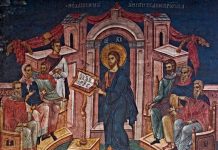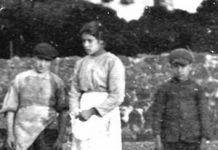On August 9th, the universal Church celebrates the feast of Saint Teresa Benedicta of the Cross. Pope Saint John Paul II gives us an interesting picture about her. In fact, this Polish Pontiff helps us tackle and reply to this important question: Why is Saint Teresa Benedicta of the Cross so important within the recent history of the Church and her relationship with the Jewish people?
Before delving deeper into this argument it would be wise to give a biographical sketch in order to contextualize the person. Edith Stein was born in 1891 to a Jewish family from Breslau which, in those days, was part of the German territory. Edith decided to live her life by upholding strict rationalistic principles. What contributed to her decision to do so was her dedicated interest in philosophy and, most of all, her complete abandonment of religious practice which her mother had inculcated in her since she was a child. Strange as it may seem, as Pope Saint John Paul II beautifully put it in his apostolic letter proclaiming Saint Teresa Benedicta of the Cross, together with Saint Bridget of Sweden and Saint Catherin of Siena as Co-Patronesses of Europe, Spes Aedificandi, it was precisely along the byways of philosophical investigation that grace awaited her (no.8). In fact, the study of phenomenology made her more in tune with objective reality. The latter called her to heed it and grasp it through the capacity for “empathy”, or the ability to make one’s own experience of the other.
Her investigation on empathy, as shown in her book The Problem of Empathy, helped Edith to adopt a listening presence for others. Thus, when she met with the Christian spiritual experience of Saint Teresa of Avila and other giants of Christian mysticism coupled with the traditional Christian thought strengthened by the philosophy of Saint Thomas Aquinas, Edith recognized that within the Christian faith she found what she was looking for. As Pope Saint John Paul II said, this path brought her first to Baptism and then to the choice of a contemplative life in the Carmelite Order (no.8). Even if the journey was tumultuous, her internal strength for searching as well as her assiduous commitment to study and teaching helped her reach her goal. Let us not forget about Edith’s struggle to promote women’s social status. With how much reflection and dedication Edith unravelled the intrinsic values of womanhood and the woman’s mission from the human and religious point of view.
Another very interesting aspect which clearly emerges from the life of Edith Stein was that her meeting with Christianity greatly helped her rediscover her Jewish roots. Obviously her familial milieu greatly discouraged such a risky yet fascinating journey. Pope Wojtyla tells her that her mother’s disapproval … caused her profound pain (no.9). Moreover, her entire journey towards Christian perfection was marked not only by human solidarity with her native people but also by a true spiritual sharing in the vocation of the children of Abraham, marked by the mystery of God’s call and his “irrevocable gifts” (cf. Rom 11:29) (no.9).
God’s greatness in Edith Stein was shown when she took on her shoulders the barbaric persecutions the Nazis were doing against her people. Pope John Paul II explained that at the time, she felt that in the systematic extermination of the Jews the Cross of Christ was being laid on her people, and she herself took personal part in it by her deportation and execution in the infamous camp of Auschwitz-Birkenau (no.9). What this clearly means is that her voice merged with the cry of all the victims of that appalling tragedy, but at the same time was joined to the cry of Christ on the Cross which gives to human suffering a mysterious and enduring fruitfulness (no.9).
The important figure of Saint Teresa Benedicta of the Cross reminds us that Europe and the civilized world is in dire need of people who stand their ground even if they are murdered. Europe and the developed world need people who build bridges marked with respect, fraternal love and dialogue, tolerance and deep empathy for one another, irrespective of their faiths and religious beliefs. Furthermore, Saint Teresa Benedicta of the Cross keeps reminding us Christians of our special relationship with our brothers and sisters of the Jewish faith and how important and vital it is that we keep our fraternal dialogue with them.
Pope Saint John Paul II said all this in Spes Aedificandi: Today we look upon Teresa Benedicta of the Cross and, in her witness as an innocent victim, we recognize an imitation of the Sacrificial Lamb and a protest against every violation of the fundamental rights of the person. We also recognize in it the pledge of a renewed encounter between Jews and Christians which, following the desire expressed by the Second Vatican Council, is now entering upon a time of promise marked by openness on both sides. Today’s proclamation of Edith Stein as a Co-Patroness of Europe is intended to raise on this Continent a banner of respect, tolerance and acceptance which invites all men and women to understand and appreciate each other, transcending their ethnic, cultural and religious differences in order to form a truly fraternal society (no. 9).
In one of her writings she wrote: Our love of neighbour is the measure of our love of God. For Christians — and not only for them — no one is a ‘stranger’. The love of Christ knows no borders. May this become our life’s motto!
Let us pray with Saint Teresa Benedicta of the Cross the following prayer:
O Prince of Peace, to all who receive You, You bright light and peace. Help me to live in daily contact with You, listening to the words You have spoken and obeying them. O Divine Child, I place my hands in Yours; I shall follow You. Oh, let Your divine life flow into me.
I will go unto the altar of God. It is not myself and my tiny little affairs that matter here, but the great sacrifice of atonement. I surrender myself entirely to Your divine will, O Lord. Make my heart grow greater and wider, out of itself into the Divine Life.
O my God, fill my soul with holy joy, courage and strength to serve You. Enkindle Your love in me and then walk with me along the next stretch of road before me. I do not see very far ahead, but when I have arrived where the horizon now closes down, a new prospect will open before me and I shall met with peace.
How wondrous are the marvels of your love, We are amazed, we stammer and grow dumb, for word and spirit fail us.









